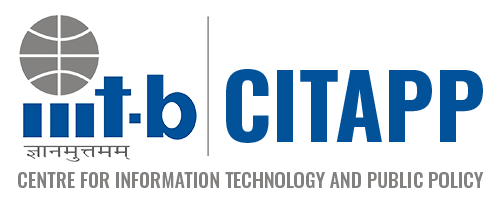The Center for Information Technology and Public Policy (CITAPP)
International Institute of Information Technology Bangalore (IIITB)
organized a talk titled
Do the next billion users need more innovation? Rethinking AI for the common good
by
Payal Arora
Erasmus University Rotterdam, the Netherlands
2:00 pm, 20th January 2020 (Monday)
Venue: Room R103, IIITB campus
26/C, Electronic City, Hosur Road, Bangalore
About the talk: The 21st century is marketed as the age of innovation. Sir John Chisholm, an expert on change management, declares that technology will change “the very future of the human race.” Ryan Allis – an angel investor in 25 companies including SpaceX, Elon Musk’s Mars project— provides a startup guide to ease us into this new era. All we need to do is reimagine “everything,” says Allis. With just “a laptop, a smartphone, and the cloud,” we can access any service anytime. While traditional institutions such as the educational system in low- income countries is regarded as a “stunning market failure” according to the likes of Matt Keller, former Director of the Global Learning XPRIZE, the market “success” of new technology will step in and take its place. Smart technology will replace not-so-smart people. Humans, it seems, have become obstacles to their own betterment. Technology entrepreneurs today are busy making all- inclusive, self- contained autonomous apps for the next billion users –majority of whom are outside the West and live in countries with less liberal institutions. Centralized reform is being discarded for personalized solutionism. Automation of self-help is the foundation of the innovation age. This talk will argue against this popular narrative and bring to question this laboratory approach of using the next billion users as the guinea pigs for social progress – and why we have become more forgiving of technological failure than of human failure.
Speaker Bio: Payal Arora is a digital anthropologist and author, consultant, founder, editor, and professor at Erasmus University Rotterdam. She holds the Chair in Technology, Values, and Global Media Cultures. Her expertise lies in digital media experience and user values among low-income communities worldwide and comes with more than a decade of fieldwork experience in such contexts. She is the author of a number of books including the award-winning ‘Leisure Commons’ and most recently the “The Next Billion Users” with Harvard Press. Engadget (Top 5 in the ‘Technorati top 100’ and Times endorsed ‘best blogs on tech’) stated that her Harvard book is “the most interesting, thought provoking books on science and technology we can find.” Forbes named her the “next billion champion” and the right kind of person to reform tech. Several international media outlets have covered her work including The BBC, The Economist, Quartz, Tech Crunch, The Boston Globe, F.A.Z, The Nation and CBC. She has consulted on tech innovation for diverse organizations such as UNESCO, KPMG, GE, and HP and has given more than 170 presentations in 109 cities in 54 countries including a TEDx talk on the future of the internet. She is the founder of Catalyst Lab, a digital activism organization and sits on several boards such as Columbia Univ. Earth Institute and World Women Global Council in New York. She has held Fellow positions at GE, ZEMKI, ITSRio, and NYU and is a Section Editor for Global Perspectives, a new University of California Press journal. She has a Masters in International Policy from Harvard University and a PhD in International and Transcultural Studies from Columbia University.
